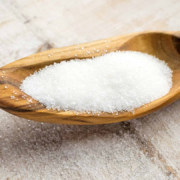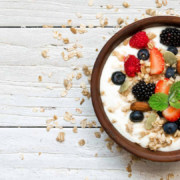Reconciliation of Differences between Observational Studies and Randomized Controlled Trials: A Case Study on Low Calorie Sweeteners
Scientific evidence is commonly categorized into levels based on quality of evidence, commonly referred to as the hierarchy of evidence. The complexity of evaluating study quality based on study design becomes problematic for dietary exposures and health outcomes with conflicting evidence observed in observational studies and RCTs. Such conflicting evidence is well documented for low calorie sweeteners (LCS), in which observational trials tend to identify adverse associations between LCS use and adiposity, type 2 diabetes (T2D), mortality, cardiovascular disease (CVD), and cancer while RCTs highlight benefits or no effect of LCS on body weight, energy intake, markers of T2D, and markers of CVD (6). One possible explanation for this is that observational trials and RCT are simply addressing different research questions, evaluating different exposures, comparators, and outcomes.
The objective of the proposed project is to educate stakeholders on how to interpret contrasting evidence from observational studies and RCTs based on methodological differences between study designs, using LCS as a case-study. A rapid review of systematic reviews and metaanalyses on LCS and various health outcomes will be conducted to highlight how different intervention/exposures, comparators, outcomes, and study designs produce varying conclusions regarding the efficacy and safety of LCS. The deliverables of this project will be a peer-reviewed publication and presentation of findings at a conference for nutrition and dietetics practitioners
Institution: USDA Agricultural Research Service
Principal Investigator: Kelly Higgins, MPH PhD; David Baer, PhD
Year: 2022
This work was supported by the IAFNS Low- and No-Calorie Sweeteners Committee.
Addressing Perceptions of Low- and No-Calorie Sweeteners in the Healthcare Practitioner Community
Misperceptions are not new about low-and no-calorie sweeteners (LNCSs) within the healthcare practitioner (HCP) community and among consumers. Some confusion can be attributed to the mixed literature on LNCSs that results from variation in study hypotheses, design, interpretation and communication. Understanding HCP perspectives on LNCSs supports science-based information delivery to patients and clients. The first step in understanding these perspectives is to conduct a review of publicly available information, including published literature, surveys, market research and HCP professional organization policy statements, among other materials. This will inform the design of a more robust HCP survey to fill in gaps, and ultimately the content and delivery of science-based information appropriate to each topic. The objectives of Phase II of this project are to directly engage with HCPs, to: 1) assess HCPs' perspectives on the use of LNCSs for achieving various dietary goals, and 2) evaluate the effectiveness of science-based information on the safety evaluation process of LNCSs for addressing HCPs misperceptions of LNCSs.
Institution: University of Massachusetts Amherst
Principal Investigator: Dr. Alissa Nolden
Start Date: September 15, 2021
Learn More: FDA Regulatory Review Process For Food Additives-Including Low And No Calorie Sweeteners
This work is supported by the IAFNS Low- and No-Calorie Sweeteners Committee
Evidence Map on the Relationship Between Exposure to Dietary Sweetness and Body Weight-Related Outcomes in Adults
Dietary recommendations from numerous governmental and health organizations recommend reduced intake of added sugars due to the health risks, including the risk of overweight and obesity. Some recommendations include avoiding dietary sweetness - regardless of the source - based on the hypothesis that reduced exposure to dietary sweetness will reduce the preference and desire for sweet foods/beverages. Given the limited or lack of association between dietary sweetness and food choice, it is unclear whether reducing dietary sweetness would result in beneficial changes in body composition. Before a conclusion on the association between dietary sweetness and body weight could be determined, it was necessary to determine the availability of evidence in the published literature. This evidence map was conducted to characterize the evidence on the association between dietary sweetness and body weight-related outcomes. The objective of this work was to determine whether there was sufficient evidence to conduct a systematic evidence review and identify future research priorities.
Institution: USDA Agricultural Research Service
Principal Investigators: Kelly Higgins, PhD; David Baer, PhD
Year Awarded: 2021
View a recording of IAFNS' April 20 webinar "Dietary Sweetness & Body Weight: What Do We Know and Where Do We Go From Here?"
View this project on the Center for Open Science’s Open Science Framework here.
This work is supported by the IAFNS Low- and No-Calorie Sweeteners Committee and Carbohydrates Committee.
Assessing the Relationship between Low-Calorie Sweetener Use and Quality of Life Measures in Adults with Type 1 Diabetes
Low- and No- calorie sweeteners (LNCSs) have been acknowledged as a tool for reducing the intake of total carbohydrates and particularly added sugars in the nutritional management of diabetes. LNCSs may also help to improve Quality of Life (QoL). QoL is an important aspect in management of diabetes as reduced QoL can negatively affect diabetes-related outcomes. As such, understanding the potential relationship between use of LNCSs to replace added sugars and excess carbohydrate in the diet on QoL is important. This knowledge may also be useful to clinicians who field questions about the general utility of LNCSs. A recent systematic review sponsored by the World Health Organization that was designed to investigate the effects of LCS use for people with diabetes included health-related QoL as an outcome measure. However, authors did not identify any data in the peer-reviewed literature that met the inclusion-exclusion criteria specified. Authors concluded that data on this “patient-important outcome” were “scarce or lacking”. The objective of this work is to assess the relationship between use of LCSs and health-related Quality of Life (QoL) measures in individuals residing in North America that were diagnosed with diabetes (type 1) not less than 1 year ago.
Institution: University of Colorado
Principal Investigator: Halis K. Akturk, MD
Year Awarded: 2021
View this project on the Center for Open Science’s Open Science Framework here.
This work is supported by the IAFNS Low- and No-Calorie Sweeteners Committee




